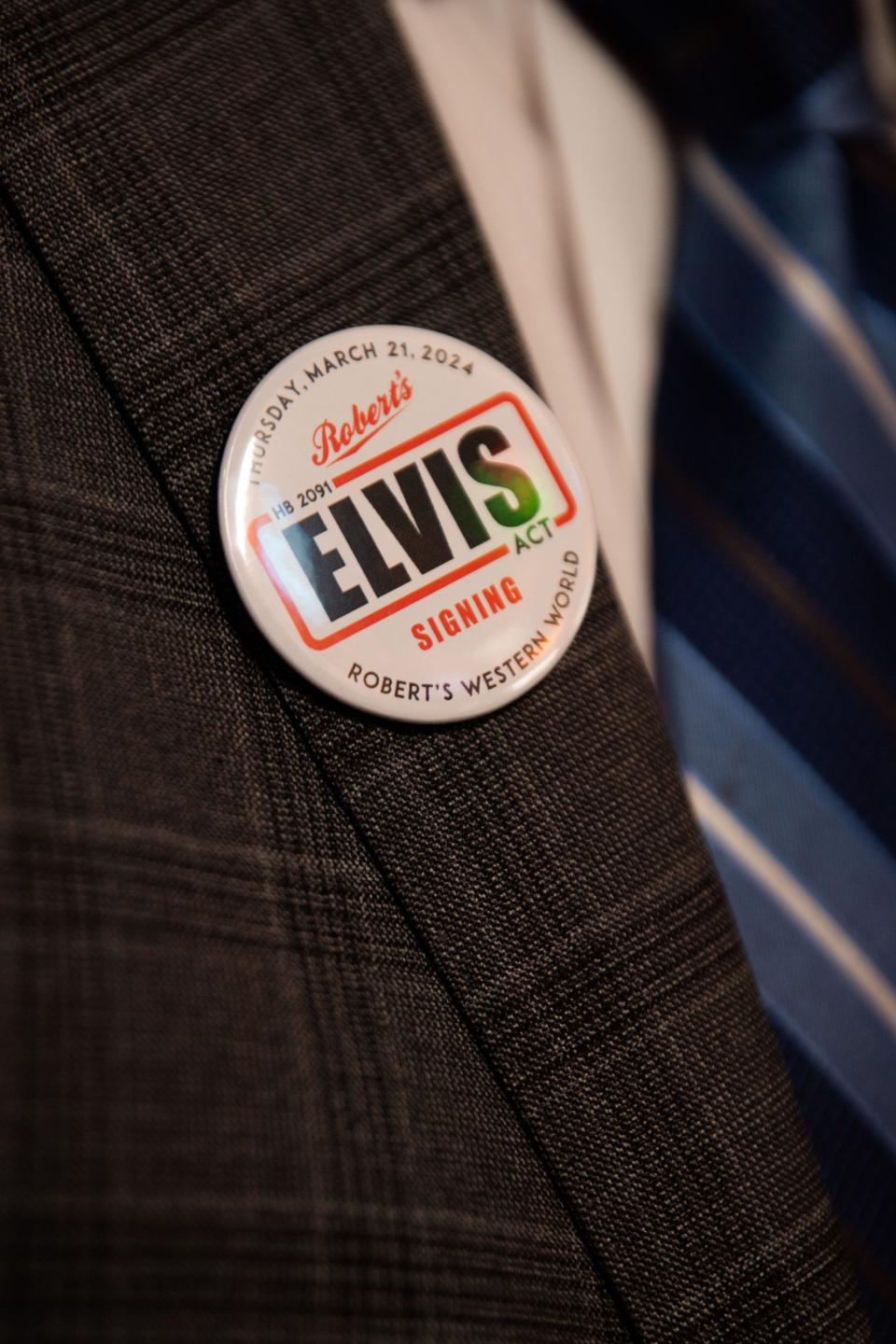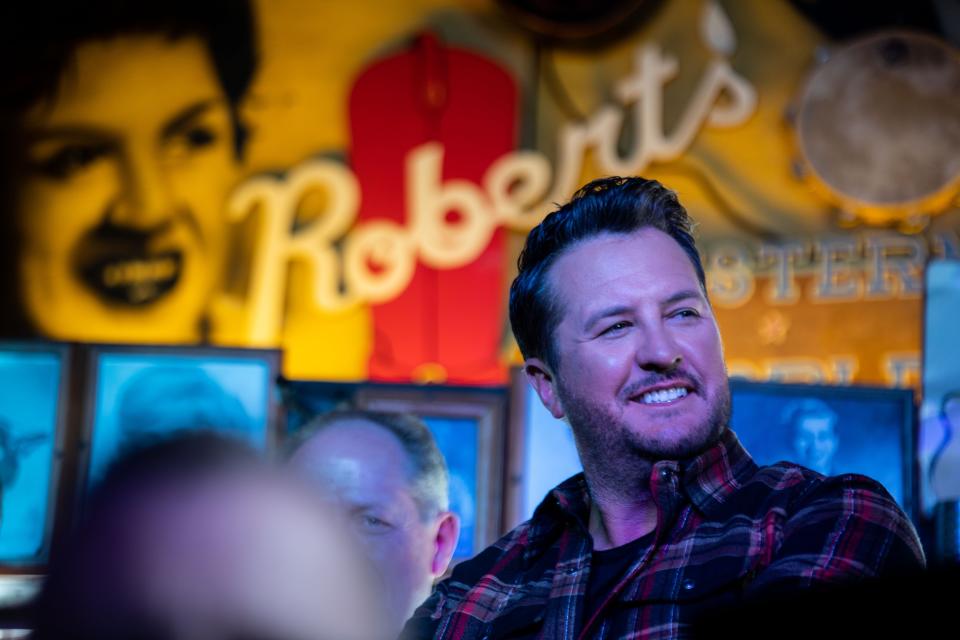Tennessee is the first state to enact AI regulations in music; other artists want the same
Tennessee made history in March by becoming the first state in the country to enact protections for artists against the misuse of artificial intelligence. The Ensuring Likeness Voice and Image Security Act, or ELVIS act, enacts voice protections against deepfakes and unauthorized uses of artists' voices and likenesses.
In March, Gov. Bill Lee, flanked by Tennessee lawmakers and musicians, signed the bill into law at Robert's Western World.
"There are certainly many things that are positive about what AI does," Lee said. "It also, when fallen into the hands of bad actors, it can destroy this industry."
Alon Yamin, co-founder and CEO of Copyleaks, an AI-based text analysis platform, said the ELVIS act is a "step in the right direction."
"This is happening in one state [Tennessee] but this is something that can happen all over the world, and I think it's going to be a bigger issue actually," Yamin said. "Taking these next steps is a step in the right direction."
Yamin said that while AI is a powerful tool which can provide access to data and information, it's important to have detection capabilities in place that are able to identify where AI is being misused, to leverage AI for the benefits and good things that the technology is capable of.
What is the ELVIS act?

Lee proposed the ELVIS Act in January.
The act adds artists' voices to the state's current Protection of Personal Rights law and can be criminally enforced by district attorneys as a Class A misdemeanor. Artists — and anyone else with exclusive licenses, like labels and distribution groups — can sue civilly for damages.
What artists support regulations against the misuse of AI in the music industry?

On Thursday, March 21, country star Luke Bryan spoke out in support of the ELVIS Act. He said that managers are coming to him after hearing AI recordings of their artists and not being able to tell that it is actually an AI recording of their artist's voice instead.
"I've just gotten to where stuff comes in of my voice on my phone, and I can't tell it's not me," Bryan said at the signing of the Bill with Lee. "It's a real deal."
Chris Janson was also present at the bill signing. He said without songwriting, he is unable to tour or feed his children.
"People can't come to shows and hear live music if we don't put a stop to the fakeness," Janson said. "We came to a real city to make real music for real people."
Other supporters of the bill include CMA Entertainer of the Year Lainey Wilson, Jamie Moore, Maggie Rose, Matthew West and Tom Douglas, Recording Academy CEO Harvey Mason, Jr. and Lindsay Ell.
In February, Wilson testified before Congress about the dangers of artificial intelligence's misuse in the music industry.
"I do not have to tell you how much of a gut punch it is to have your name, your likeness or your voice ripped from you and used in ways that you could never imagine or would never allow," Wilson told members of Congress. "It is wrong, plain and simple."
Less than two weeks after the ELVIS Act was passed, more than 200 artists signed an open letter calling on tech companies to stop using AI which undermines or replaces human artistry. The letter was put forth by the nonprofit organization, Artist Rights Alliance.
200+ artists call on tech companies to stop AI use that devalues music and infringes upon the rights of human artists. AI has enormous potential as a tool for human creativity – but when used irresponsibly, it poses an existential threat to our art. https://t.co/AaxboN5CEX pic.twitter.com/CPBeRX46td
— Artist Rights Alliance (@artistrightsnow) April 2, 2024
The letter recognized that when used responsibly, AI has enormous potential to advance human creativity but some platforms and developers employ AI to sabotage creativity.
"When used irresponsibly, AI poses enormous threats to our ability to protect our privacy, our identities, our music and our livelihoods. Some of the biggest and most powerful companies are, without permission, using our work to train AI models," the letter says. "For many working musicians, artists and songwriters who are just trying to make ends meet, this would be catastrophic."
Artists who signed the letter include Darius Rucker, Jason Isbell, Kacey Musgraves. Sheryl Crow, Rosanne Cash, Miranda Lambert and Marcus King, among others.
How could AI regulations impact other industries?
AI regulations are also making waves in the tech industry.
According to Yamin, there is a worry in the tech industry that if there is too much regulation, only the big tech players like Meta or Microsoft will have access to the technology.
"Then what happens to startups, that are really trying to create something innovative and new, yet they cant afford all the legal fees required to check all the boxes in order to approach AI in a compliant way?" Yamin asked.
Smaller-sized software companies in Silicon Valley share the same sentiment.
According to The Washington Post, the willingness of the world's leading tech companies to embrace AI regulation is just a tactic that will allow them to secure their place in the industry.
"I think it's really interesting to see how in the end, a lot of the markets are very similar in that sense," Yamin said. "On one hand, you're protecting from the bad aspects of AI, but on the other hand, you're making it really hard for newcomers in the tech industry that're trying to innovate and hurting them in that way."
Diana Leyva covers trending news and service for The Tennessean. Contact her at [email protected] or follow her on X, the platform formerly known as Twitter at @_leyvadiana
This article originally appeared on Nashville Tennessean: Tennessee ELVIS Act: AI regulations, artist protections included
